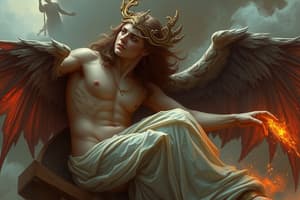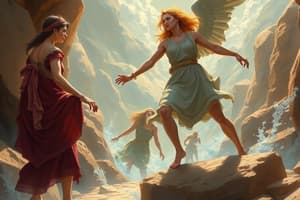Podcast
Questions and Answers
What is Ovid's relation to the stories of Greek mythology?
What is Ovid's relation to the stories of Greek mythology?
He provides narratives that connect creation stories with mythological events.
What does the term 'Oracle' refer to in the context of Cadmus founding Boeotia?
What does the term 'Oracle' refer to in the context of Cadmus founding Boeotia?
Instructions to Cadmus explaining how to found the land of Boeotia.
Who is connected to the river Pactolus in Ovid's narrative?
Who is connected to the river Pactolus in Ovid's narrative?
King Midas.
What happens to Iphigenia at the altar?
What happens to Iphigenia at the altar?
What does Ovid say about the origin of dew?
What does Ovid say about the origin of dew?
What warning does Juno give to Caenis about her identity?
What warning does Juno give to Caenis about her identity?
What is the folly of Cephalus in relation to his wife's fidelity?
What is the folly of Cephalus in relation to his wife's fidelity?
How does Midas’ wish impact his life?
How does Midas’ wish impact his life?
What mistake does the Sibyl make when wishing for eternal life?
What mistake does the Sibyl make when wishing for eternal life?
What decision does Paris make when urged by Apollo?
What decision does Paris make when urged by Apollo?
What violent act does Hecuba commit in response to her son's death?
What violent act does Hecuba commit in response to her son's death?
What does Cadmus express about happiness and prosperity?
What does Cadmus express about happiness and prosperity?
What dilemma does Medea face when speaking to Jason?
What dilemma does Medea face when speaking to Jason?
What does Pygmalion do with his statue?
What does Pygmalion do with his statue?
What value does Ulysses attribute to the mind over the body?
What value does Ulysses attribute to the mind over the body?
What assurance does Ovid give about his work?
What assurance does Ovid give about his work?
What does Ovid wish for at the beginning of his poem?
What does Ovid wish for at the beginning of his poem?
How does the purple color of grapes relate to the daughters of Minyas?
How does the purple color of grapes relate to the daughters of Minyas?
What transformation happens to Cyane?
What transformation happens to Cyane?
What is the fate of Arachne after the goddess sprinkles her with venom?
What is the fate of Arachne after the goddess sprinkles her with venom?
How does Hercules become a god?
How does Hercules become a god?
What important lesson does Apollo learn regarding youth?
What important lesson does Apollo learn regarding youth?
What does Pythagoras convey about transformation?
What does Pythagoras convey about transformation?
What does Deucalion express about love when faced with potential loss?
What does Deucalion express about love when faced with potential loss?
What internal conflict does Jupiter face regarding Io?
What internal conflict does Jupiter face regarding Io?
What drives Tereus's actions towards his wife's sister?
What drives Tereus's actions towards his wife's sister?
What is Iphis's fate regarding her love for Ianthe?
What is Iphis's fate regarding her love for Ianthe?
What does the story of Cenchreis reveal about desire?
What does the story of Cenchreis reveal about desire?
How does the creation of man reflect divine influence?
How does the creation of man reflect divine influence?
What is highlighted regarding human exploitation of the earth?
What is highlighted regarding human exploitation of the earth?
How does the origin of humanity relate to the toughness of humans?
How does the origin of humanity relate to the toughness of humans?
What sacred games were established to remember a great feat?
What sacred games were established to remember a great feat?
Flashcards are hidden until you start studying
Study Notes
Metamorphoses Key Quotes and Context
-
Cadmus on Destiny
Happiness should not be declared until death, implying that fortunes can change and life’s true assessment comes at its end. -
Medea to Jason on Love's Truth
Medea acknowledges her conflicting loyalties between her father and Jason, reflecting her deep emotional struggle driven by love. -
Pygmalion's Infatuation
Pygmalion becomes enchanted with his statue, which he idealizes above real women, illustrating the theme of artistic creation and longing. -
Ulysses on the Value of Mind
Ulysses argues for the superiority of intellect over physical strength in claiming Achilles’ arms, emphasizing the power of rhetoric and wisdom. -
Ovid's Assurance of Immortality Through Art
Ovid concludes that his work will endure against time and destruction, seeking timelessness through his poetic legacy. -
Ovid's Opening Invocation
The poem begins with an appeal for divine inspiration, establishing the theme of transformation that will unfold throughout the narrative. -
Minyas Daughters' Transformation
The daughters' weaving transforms into grapevines, showcasing the connection between past actions and divine intervention leading to metamorphosis. -
Cyane’s Transformation
Cyane’s body dissolves into water, exemplifying the complete physical transformation that signifies a loss of identity. -
Arachne’s Punishment
Arachne is turned into a spider as a result of her pride and defiance, highlighting the consequences of hubris in Ovid's tales. -
Hercules’ Ascension to Godhood
Hercules sheds his mortal skin and transforms into a god, illustrating the duality of loss and rebirth in metamorphosis. -
Sibyl's Eternal Regret
Apollo grants the Sibyl long life without youth, emphasizing the burdens of immortality and the natural cycle of aging. -
Pythagoras on Change
Pythagoras presents transformation as an essential part of life, likening time to an ever-flowing river full of constant change. -
Deucalion and Pyrrha's Love
This couple expresses deep emotional connection during a catastrophic flood, symbolizing shared love and mutual sacrifice. -
Jupiter's Dilemma Over Io
Jupiter's conflict over his love for Io, leading to her transformation into a cow, illustrates complex themes of forbidden love and metamorphosis. -
Apollo’s Grief
After wrongly killing Coronis, Apollo's regret showcases the destructive consequences of jealousy, demonstrating a tragic cycle of love and loss. -
Pyramus and Thisbe's Forbidden Love
Their passionate yet tragic love faces obstacles from their families, illustrating the theme of love's resilience despite societal constraints. -
Ceres' Devotion
Ceres searches tirelessly for her daughter Proserpina, representing maternal love's unwavering nature amidst despair. -
Medea’s Conflict
Medea struggles with her desire to aid Jason while confronted with familial loyalty, embodying the conflict between love and duty. -
Orpheus and Eurydice
Orpheus’ inability to bring Eurydice back from the dead underscores the theme of inevitable loss and the limits of love. -
Venus’ Obsession with Adonis
Venus’ diversion from her duties due to love illustrates how passion can alter priorities and behaviors dramatically. -
Tereus's Dark Desires
Tereus represents the destructive nature of unchecked desire, reflecting the darker sides of human nature and obsession. -
Iphis's Transformation
Iphis wishes to marry Ianthe despite biological conflicts, which ultimately resolves in transformation, showcasing the fluidity of identity. -
Myrra's Forbidden Love
Myrra's tragic story with her father emphasizes themes of illicit desire and the often dark consequences of love. -
Venus' Manipulations
Venus incites Hippomenes’ desire for Atalanta, exemplifying the power of lust and desire as tools for influence. -
Pomona and Vertumnus
Vertumnus uses disguise and persuasion to win Pomona's love, highlighting the theme of trickery in romantic pursuits. -
Creation of Humanity
Humanity's creation signifies a divine purpose, portraying humans as unique beings with a connection to the divine and a higher intellect. -
Iron Age Manipulation
The Age of Iron signifies humanity's exploitation of nature, manipulating it for personal gain while violating natural laws. -
Stone to Humanity
Ovid’s depiction of humans emerging from stones illustrates resilience and toughness, connecting human ancestry to their origins. -
Establishment of Pythian Games
Sacred games commemorate the victory over the serpent, blending history with cultural practices to honor divine acts. -
Cadmus' Founding Instructions
The oracle's guidance directs Cadmus in founding Boeotia, highlighting the importance of destiny and divine intervention in human affairs. -
King's Sacrifice
Agamemnon's sacrifice of Iphigenia reveals themes of conflict between personal desire and public duty, stemming from divine retribution. -
Aurora's Tears
Aurora’s mourning for her son, Memnon, symbolizes enduring grief and the natural phenomena stemming from divine emotions. -
Shifting Eras
Acknowledgment of the cyclical nature of power and decline throughout history reflects on the impermanence of human achievements.### Themes of Decline and Destruction -
Troy's demise symbolizes how even great power and wealth can lead to downfall, leaving behind only ruins and tombs.
-
Major Greek city-states like Sparta, Mycenae, and Thebes have all faced decline, demonstrating a cyclical nature of power and fame.
-
Rome rises as a new power, highlighting the constant shift in dominance throughout history.
Phaethon and the Sun Chariot
- Phaethon, son of Phoebus (sun god), recklessly requests to drive the sun chariot for a day, demonstrating youthful hubris.
- Phoebus vows to grant Phaethon’s wish, which leads to disastrous consequences, emphasizing the dangers of unchecked desire and ambition.
Folly of Excessive Desire
- Juno deceives a girl into asking Jove for a wish, paralleling Phaethon's folly and the consequences of ambition.
- The theme of unwise requests from gods to mortals is emphasized, revealing the dangers of desires that lead to ruin.
Narcissus and Self-Obsession
- Narcissus's futile love for his own reflection highlights the destructiveness of self-obsession, culminating in his demise.
Arachne's Challenge
- Arachne’s pride leads her to challenge Pallas Athene (Minerva), illustrating the folly of arrogance against divine beings.
- Her response to divine warning shows her defiance and lack of respect for the gods.
Medea's Influence on Pelias' Daughters
- Medea manipulates the daughters of Pelias into killing their father, showcasing themes of impulsivity and misguided piety.
- The daughters are portrayed as foolish for following her dangerous advice without fully understanding the consequences.
Cephalus and Jealousy
- Cephalus' obsessive fear of infidelity reveals his inner conflict and self-criticism, driven by irrational jealousy.
King Midas and Greed
- Midas’s foolish wish for everything he touches to turn to gold warns against the dangers of greed and the unforeseen consequences of desires.
The Sibyl's Request for Eternal Life
- The Sibyl's wish for eternal life without accompanying youth represents the folly of desiring immortality without considering the costs.
Tiresias and Gender Fluidity
- Tiresias, transformed into both male and female, symbolizes the fluid nature of identity and gender, challenging traditional norms.
Caenus and Gender Identity
- The dialogue highlights gender stereotypes and Caenus's fight against being seen only as Caenis, reflecting on identity and transformation.
Achilles and Ulysses
- Ulysses's discovery of Achilles disguised as a girl showcases cunning and highlights the complexity of identity and duty during war.
Juno's Revenge on Callisto
- Juno’s wrath towards Callisto for her union with Jupiter reveals themes of unjust punishment and the cycle of vengeance among the gods.
Actaeon and the Dilemma of Justice
- Diana transforms Actaeon into a stag as retribution for his accidental sighting of her bath, exploring ideas of justice and revenge.
Procne's Maternal Instincts vs. Revenge
- Procne's conflict showcases the stark contrast between maternal love and the desire for revenge, leading to tragic outcomes for innocent parties.
Nestor's Reflection on Revenge
- Nestor’s thoughts on the vengeance against Hercules convey the moral implications of denying praise to invoke revenge, emphasizing self-control.
Apollo's Influence on Paris
- Apollo guides Paris to kill Achilles, illustrating how divine beings manipulate mortals for their agendas, especially in conflict.
Hecuba's Violent Retribution
- Hecuba's brutal revenge against Polymestor for the death of her son exemplifies how maternal instincts can drive individuals to commit extreme acts of violence.
Studying That Suits You
Use AI to generate personalized quizzes and flashcards to suit your learning preferences.




